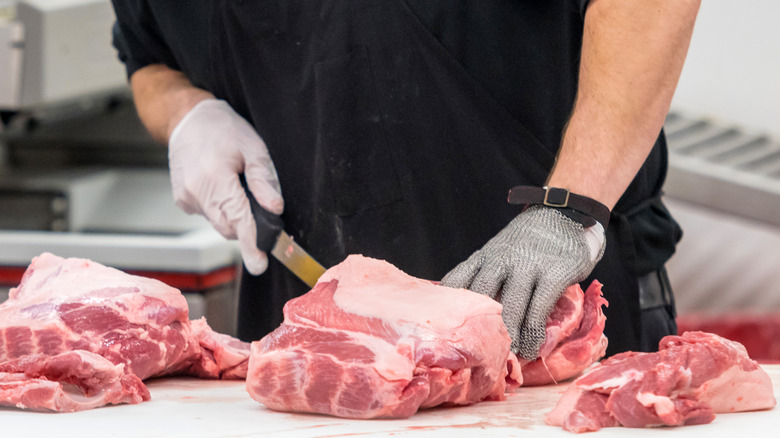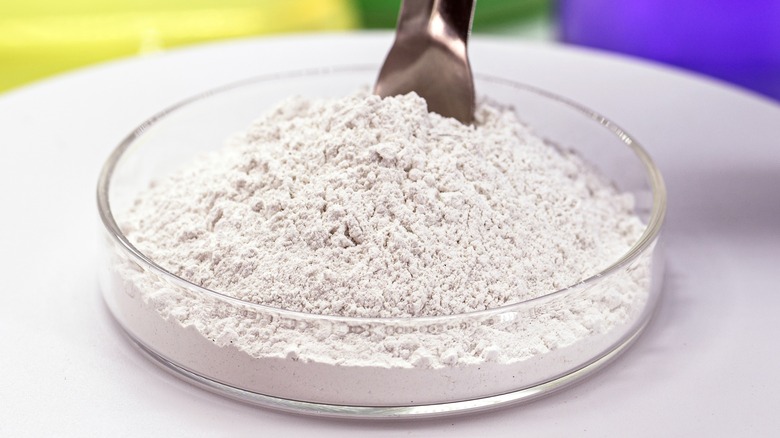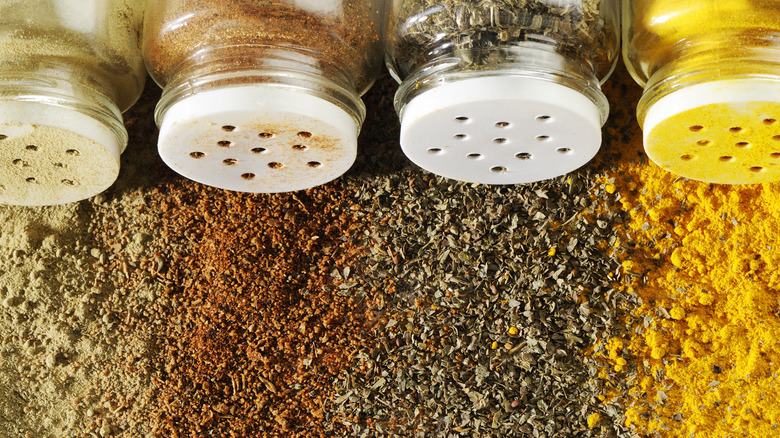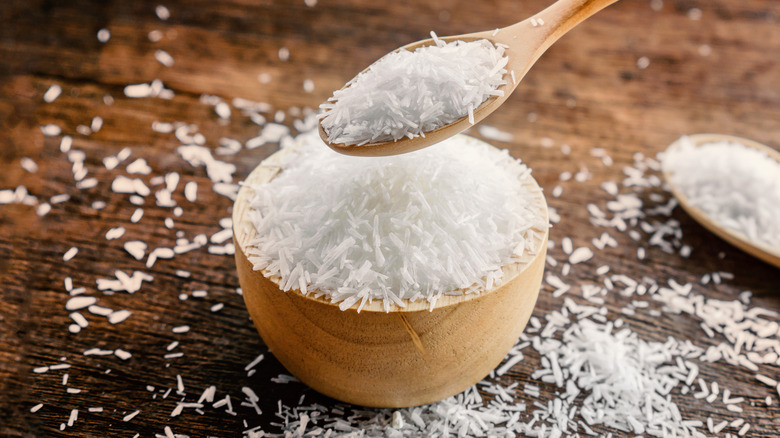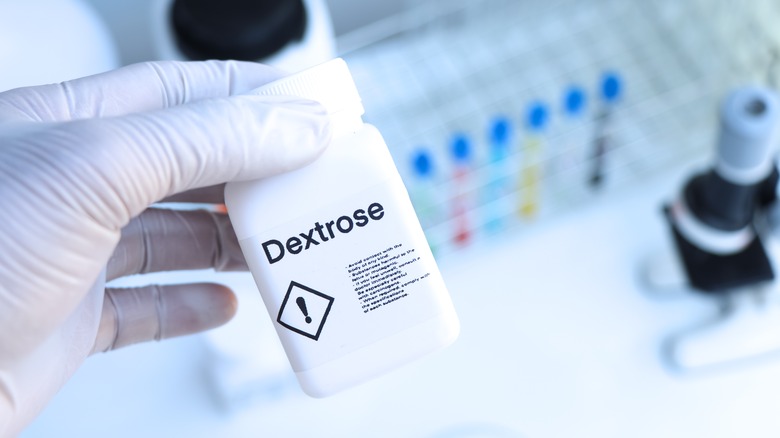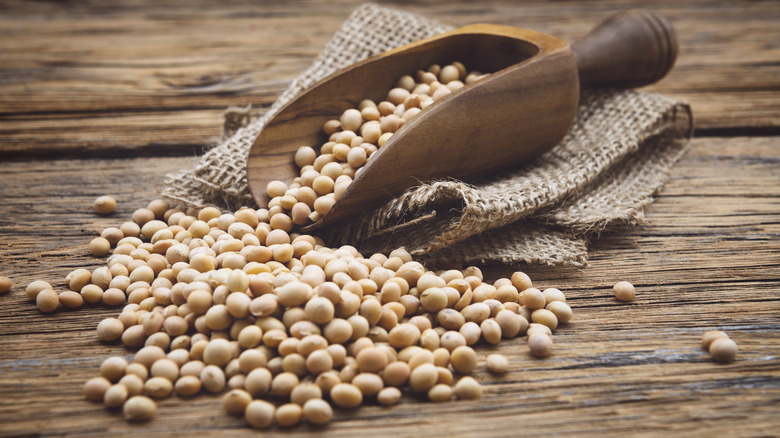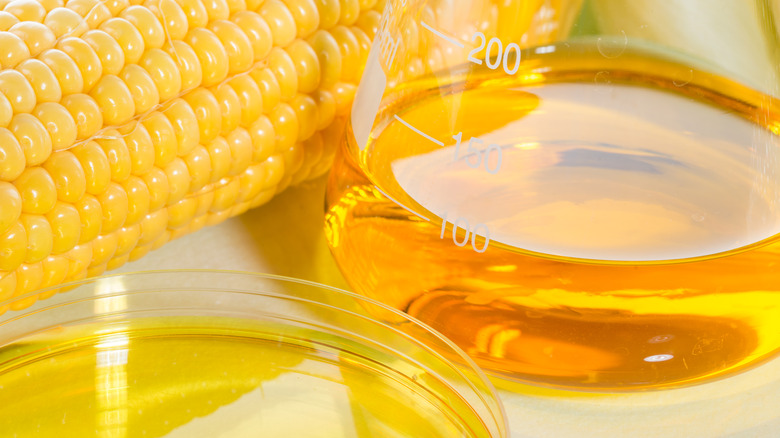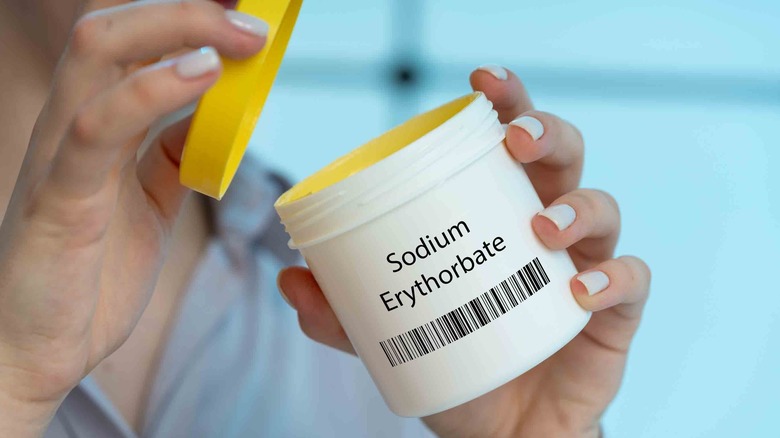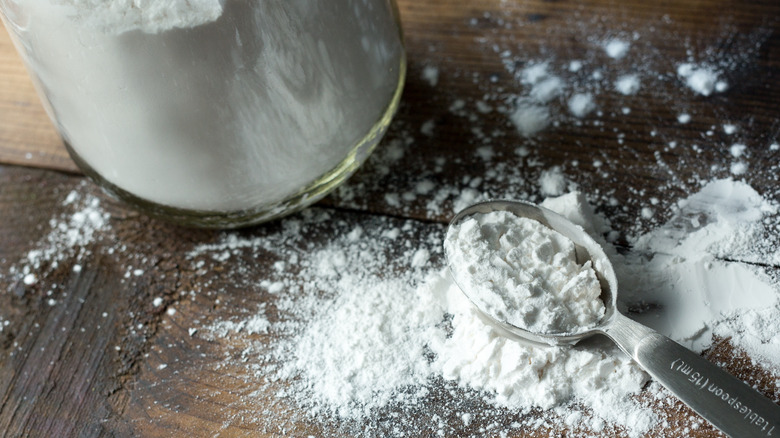What Goes Into Your Favorite Sausages?
Ah, sausage. It's one of those foods in life that we associate with so much goodness. From the juicy snappiness of smoked sausage casing to the comforting heartwarming flavor of savory sage, there's so much to love about a hearty portion of distinct-tasting, yet deliciously satisfying type of pork. With that said, you may wonder what exactly goes into your favorite sausages. After all, there are many sausage types labeled as "processed foods," and as we all know, these food types aren't exactly known for being the healthiest. And also, what's up with all those darned unfamiliar-sounding ingredients? Do they serve a purpose?
While we won't promise to answer all the burning questions you may have about sausages, we can at least give you an eagle eye's view of some of the most common ingredients in them, as well as their overall use in the sausage industry game. Ready to learn more? Stick with us as we prepare to unravel the juicy mysteries surrounding what goes into your favorite sausages!
Pork hearts
Ew, pork heart?! Yep, it's a fact. There are some brands out there that feature pork hearts as part of their concoction of goods in sausage. And yes, we use the term "goods" lightly here. In case you think the company that features this somewhat distinct ingredient in their sausages is some weird off-brand, think again. Bar-S Classic Smoked Sausage can be readily found in grocery retailers and is a fairly popular brand to boot.
So, what's the deal with using this organ meat to make sausages? Apparently, pig heart is one type of pork meat that can be readily used to make sausage, although it isn't always deemed best practice. In actuality, many suggest pork shoulder as the best meat for making sausages, and we agree — it certainly does sound a little more appetizing, doesn't it? Take it for what it's worth, but some brands like Bar-S choose to use pork heart in their sausage mixes. Thankfully, we haven't seen many other brands disclose their use of pork hearts on the label, so at least for that, you can be thankful.
A variety of meat types
Different sausage brands will use different types of meat to make their sausages. We've already reviewed the use of pork hearts in the Bar-S brand; however, other brands like Jimmy Dean and Odom's Tennessee Pride are a bit more non-specific when it comes to their labeling. You'll often see brands generalize the type of meat they use under the general guise of "pork." Still, there are plenty of brands out there that not only offer pork in their sausages, but also a hodgepodge of other meat types that you might not expect.
Meat types we've found packed in with pork can include mechanically separated chicken, as well as beef. Of course, you'll also find sausages exclusively branded as containing one meat or another, such as turkey, beef, or chicken sausages. In these cases, you will generally get exclusively one type of meat; however, this may not always be true. Also, it's important to understand that some sausage products, like Great Value Turkey Sausage Sticks, may still feature a beef casing despite being labeled as "turkey", so if those nuances make a difference to you, be sure to take note.
Potassium chloride
Potassium chloride is one of those ingredients you've likely seen on ingredient lists but bypassed due to its ambiguous title. Indeed, potassium chloride is used as an additive in many foods, with certain sausage brands, like Bar-S and Premio, being no different. What is potassium chloride, exactly? Well, it's basically salt that's been collected from the sea or ground. It isn't the same as table salt (often labeled as sodium chloride), but can help lower the sodium content in many foods. Since Americans tend to have too much sodium in their diet already, potassium chloride can act as a healthy replacement, and as such, is used by some sausage manufacturers in lieu of actual salt.
So, should you avoid this additive? Thus far, there doesn't seem to be a reason to. With that said, if you are an individual that deals with high levels of potassium in your system, then the consumption of potassium chloride isn't recommended. As always, speak with your doctor if you're concerned about your potassium levels or would like to know more about the possible effects that potassium chloride may have on your body.
Salt
Alongside the use of potassium chloride in sausages comes the addition of plain ol' salt. Salt can be used for preservation purposes, but as we all know, it's an integral part of enhancing flavor in a juicy and toothsome piece of sausage meat. And though the use of potassium chloride is designed to reduce the amount of sodium in a sausage, the addition of regular salt is usually also present, making for sausage that may still be in the dangerous range as far as sodium consumption is concerned, especially when consumed on a frequent and regular basis.
For example, Jimmy Dean Hot Sausage is a delicious raw breakfast sausage brand that features only salt (as opposed to salt and potassium chloride) in its ingredients. Its sodium content is 390 mg, but that's only for a 2-ounce serving. How big or small you make your patties along with how many you eat, will determine how much sodium you actually get. And because the recommended daily dose of salt intake is only 2,300 mg a day, you can see how multiple sausage patties could really add up. All in all, salt is a common and non-threatening ingredient that is often enjoyed in delicious cuts of pork. But for health's sake, it is always recommended to limit your salt consumption due to the negative effects (such as heart disease and high blood pressure) that too much of it can have on your health (via Harvard T.H. Chan School of Public Health).
Seasonings
Seasonings are essential to sausages to make them taste good, right? Yes, of course! You'll usually find seasonings on almost any sausage ingredient label, from the ones that are cut into links to those sold as ropes. Seasonings are what give sausages their own unique flavor; however, they can differ greatly depending on the brand and type of sausage you buy.
As we've studied various sausage types, we've noticed that some sausages can be quite forthright with the seasonings they use, while others tend to be a bit more vague. Some brands choose to use ambiguous terms like "seasonings" or "flavorings" without really breaking down the delicious details that might clue us into exactly what they use to make the sausage taste so good. Either way, you can find some brands that get really specific, like the maple syrup found in Johnsonville Vermont Maple Syrup Sausage Links or the paprika, onion powder, and dehydrated garlic found in some Johnsonville's Andouille Chicken Sausage. Yum!
MSG (monosodium glutamate)
Ah, good ol' MSG. This additive is very controversial to say the least, though some findings indicate that MSG has little to no lasting effects on individuals not sensitive to it (via the FDA). With that said, we want you to know that MSG, also known as monosodium glutamate, plays a very important role in sausages no matter what current scientific findings have to say about it.
Though sausages are already known for their uniquely savory flavor, the addition of MSG works to amplify that flavor. This powdery white substance adds a wonderful umami flavor to the sausage, and as such, some of the most tasty and flavorful sausages often contain this yummy yet hotly debated additive.
As for which brands you can expect to contain the ingredient? It really depends. Some brands like Johnsonville have made efforts to eliminate MSG from at least some of their sausages, while others like Hillshire Farm, Purnell's, and Jimmy Dean still sneak a bit of it in for flavor's sake. There are also sausage types within the same brand that feature MSG, and others that don't. Ultimately, it'll be up to you to keep a lookout for this one; it'll be especially important if you are MSG-sensitive.
Sodium phosphate
What does a combination of salt and phosphate have to do with the production of sausage? You'd be surprised! Sodium phosphate is an additive you'll often see in cuts of sausage pork, and it serves a variety of purposes. Sodium phosphate in sausages often works to cure meat, while also allowing it to retain its moisture. Additionally, it can also balance the pH in food to help its flavor stay tasty, and simultaneously extend the amount of time it stays fresh.
Apart from its preserving qualities, it is also possible that eating too much sodium phosphate can cause issues. These issues can vary but can be linked to health problems ranging from kidney disease to heart disease (via Healthline). Thus, as with most additives, you'll want to limit your consumption of sausages and other foods containing sodium phosphate to lower your risks for complications down the road. So, which brands are most likely to feature sodium phosphate? Mostly brands that offer smoked sausages. These include brands like Klements, Hillshire Farm, Smithfield, and even Johnsonville, all of which include this useful though potentially detrimental additive.
Dextrose
You may know that dextrose is a type of sugar, but you may not know why exactly it's so often found on the ingredient label of your favorite sausage found in-store. Brands like Johnsonville, Klement, and Jimmy Dean feature dextrose in certain types of sausages they sell because it can offer a pleasantly sweet and tangy flavor, while aiding in the fermenting process. It is often much sweeter than regular sugar, and often used in prepackaged, cured, and highly processed foods.
With this in mind, you may wonder whether dextrose will have any negative effect on your health. Since dextrose is so similar in its makeup to glucose in the human body, it can sharply increase blood sugar levels when consumed. As a result, you may expect an increase in the risk for obesity, diabetes, liver disease, and more over time (via WebMD). Despite these facts, dextrose proves useful for its flavoring and properties that help it assist in the overall fermentation process for different sausage types. Whether you should have too much of it, well, that's another topic completely.
Sodium diacetate
Yep, this is another "sodium" style additive that you'll often find in your favorite sausages. We've found sodium diacetate mainly in smoked sausage varieties, including Johnsonville, Eckrich, Bar-S, and Klement brands. Its purpose seems to be to inhibit mold and bacteria development within the meat. Sodium diacetate will feature a distinct vinegary taste, primarily due to the fact that it is one of the main ingredients in vinegar itself.
So, is it safe? Seems so. There isn't much we could dig up in regard to any particularly scary or harrowing effects this one might have on your health. Its overall role seems to be to simply prevent your food from acquiring icky germs in its preserved state while also adding a bit of yummy flavoring to the mix. Overall, sodium diacetate, though still an additive, isn't so frightening when you consider its general use and the seemingly low risks associated with consuming it.
Soy protein
Soy protein is often used as a filler in sausages. It can make sausages appear more plump and improve the overall texture of the meat while helping lower the fat content in certain sausage types. Soy protein can be found in a variety of processed meats, and yes, your sausage is one of them. Though not every sausage you find will contain this filler, some will. Your typical "roll" style breakfast sausage isn't likely to feature this ingredient, but brands that sell precooked sausages just might.
So far, we've found Hillshire Farm to use soy protein concentrate the most, though we're sure you'll find other brands that add this component to their ingredients, as well. While most soy protein is fine for your health, know that it is also considered genetically modified (GMO), and that many people fear it may increase the risk of breast cancer and other complications, despite recent findings that seem to challenge this belief (via Harvard T.H. Chan School of Public Health).
Corn syrup
When it comes to corn syrup in sausages, the name of the game seems to add a bit of sweetness and also to improve moisture retention within the meat. While you may think of corn syrup as similar to high fructose corn syrup, the truth is that corn syrup tastes less sweet. As a result, the addition of corn syrup is perfect for foods like sausage that may benefit from just a hint of sweetness without coming off as overwhelmingly sugary on the taste buds.
When it comes to which brands will actually contain corn syrup, you can expect to find it in some of the most popular sausage grabs, including Jimmy Dean, Hillshire Farm, Bar-S, and more. We don't see it in Odom's Tennessee Pride Mild Roll nor have we found it in Bob Evans Original Pork roll variety, either. Still, it's important to check the label if the use of corn syrup bothers you since the ingredients added can vary even within the same brand, depending on the sausage flavor and type.
Sodium nitrate (and nitrite)
Sodium nitrate, along with sodium nitrite, are commonly found in processed meats, including deli meat, bacon, and — you guessed it — sausage. While these additives are often replaced with celery powder or celery extract in "natural" or "uncured" varieties, your typical sausage is very likely to contain nitrates and nitrites, particularly if they are of the smoked sausage or precooked variety.
Nitrites and nitrates are often added to foods to preserve them. Since these compounds have been linked to cancer (via The Guardian), it is recommended that cured meat enthusiasts limit their intake of such foods. Still, nitrates and nitrites play the important role of adding that lovely pink hue to precooked and cured meat, along with the added benefit of extending its shelf life.
Brands like Bar-S, Hillshire Farm, Johnsonville, and many others contain nitrates and nitrites in their sausages. So, what's the best way to avoid them? Try purchasing your sausages in "roll" form instead. According to our research, Jimmy Dean's Mild Sausage Roll, Odom's Tennessee Pride, and Purnell's Old Folk's roll all do not have added nitrates or nitrites. Stick to these sausage types if you wish to consume pork that has less nitrites and nitrates.
Sodium erythorbate
Sodium erythorbate is found in many cured sausage types. This type of additive is known for adding a pink or red coloring to meats that remains even after the meat has been sliced. In addition, sodium erythorbate can speed up the curing process, which saves time for the manufacturer. As to whether it's good for your health? It depends.
While we wouldn't promote sodium erythorbate as "good" for your health, we haven't seen many links to it having a harmful outcome, either. But as always, there are some people out there who might be sensitive to the additive, and thus, may experience some ailments after consuming sausages with sodium erythorbate in them, including fatigue, skin flushing, and headaches (via Healthfully). Nevertheless, this isn't a common occurrence, and therefore, we aren't overly concerned about spotting this ingredient in our sausages. In case you're wondering, brands we've found that contain sodium erythorbate include almost all the usual suspects that offer precooked cured sausage. These include Hillshire Farm, Johnsonville, and Eckrich, to name a few.
Modified food starch
Modified food starch is an ingredient you'll sometimes find in sausage products, although its use isn't as widespread as some of the other ingredients on this list. Modified food starch is most commonly used as a thickener and emulsifier in processed foods. In sausages, it may help improve the texture of the meat and help with moisture retention. It comes from a variety of sources, including potato and corn; however, despite its name, it isn't usually genetically modified.
There are only a few brands we've seen featuring modified food scratch with Eckrich and Bar-S being two of them. To know for sure whether your favorite sausage brands use them, scan the label, but be sure to do so for each variety within the brand that you love. As mentioned, usage of certain ingredients often varies — even within the same brand — so taking a glance (and even a double glance) at the package label can really help when you are trying to avoid certain additives.


